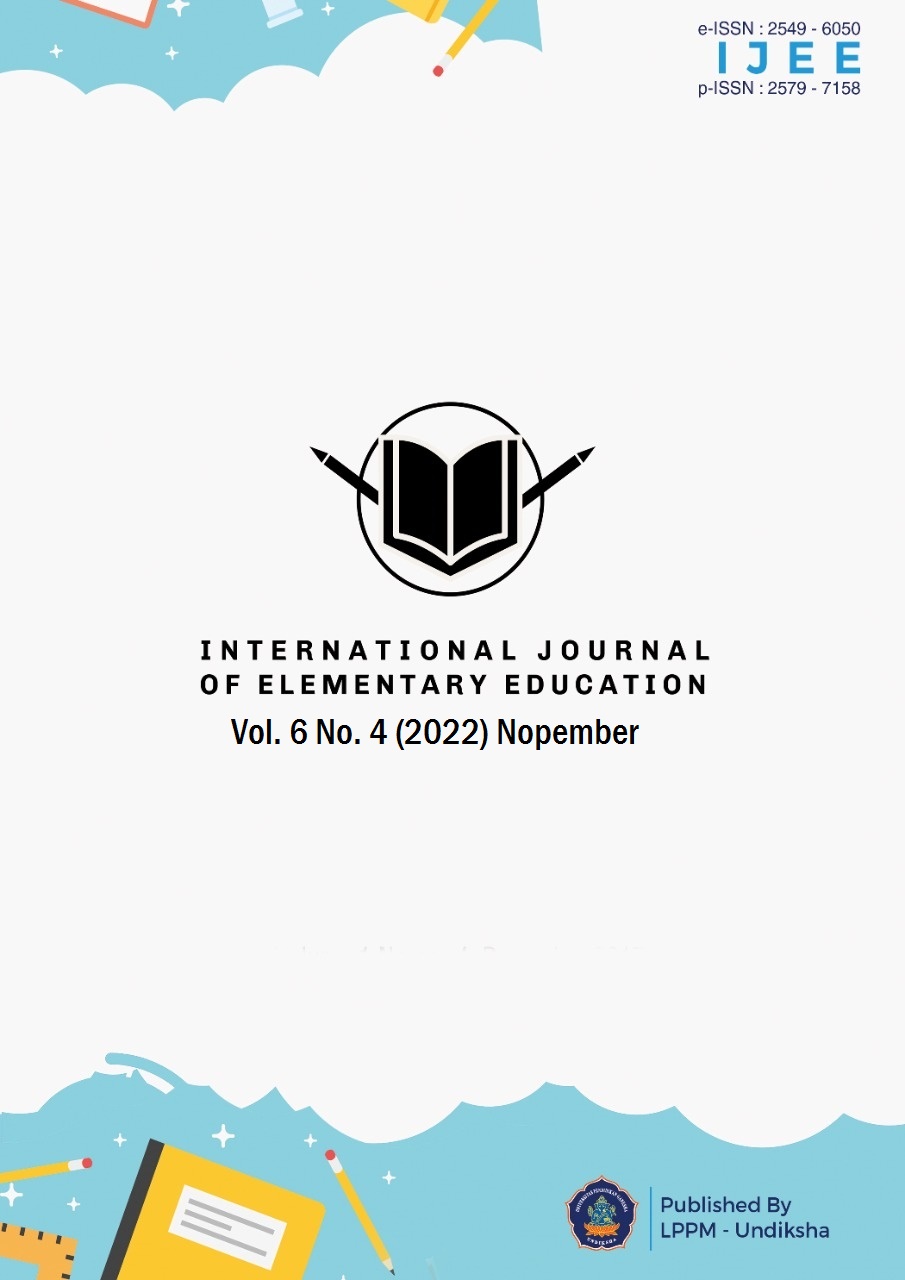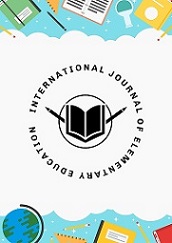Website-Based Learning Media on Reading and Numeracy Content for Third Grade Elementary Schools
DOI:
https://doi.org/10.23887/ijee.v7i1.58269Keywords:
Website-based learning, Reading, Numeracy, Learning mediaAbstract
Learning technology continues to improve along with the times. The role of technology currently has very rapid development in various fields. Many media can help improve the quality and quantity of learning, one of which is the application of website-based learning. This study aims to develop web-based learning media on reading and arithmetic content for third-grade elementary school students and test the feasibility of these learning media. This study used the R&D (Research and Development) development method with the Luther Sutopo version of the MDLC development model. The method used to collect data is suryev. The instrument used to collect data is a questionnaire. The research subjects were two learning media experts and two learning material experts. The data analysis technique used is quantitative. The research results, namely the assessment given by learning media experts, have an average value of coefficient V 0.87, declared valid. The material expert validator has an average efficiency value of V 0.81, declared valid. The average result of a user questionnaire, namely grade III elementary school students, is 83.12 in the excellent category. Based on the results of tests, Web-based learning media on reading and arithmetic content for grade III elementary school students is feasible.
References
Agustin, F., Aini, Q., Khoirunisa, A., & Nabila, E. A. (2020). Utilization of Blockchain Technology for Management E-Certificate Open Journal System. Aptisi Transactions on Management (ATM), 4(2), 134–139. https://doi.org/10.33050/atm.v4i2.1293. DOI: https://doi.org/10.33050/atm.v4i2.1293
Ahmad, D. N., Astriani, M. M., Alfahnum, M., & Setyowati, L. (2021). Increasing creative thinking of students by learning organization with steam education. Jurnal Pendidikan IPA Indonesia, 10(1), 103–110. https://doi.org/10.15294/jpii.v10i1.27146. DOI: https://doi.org/10.15294/jpii.v10i1.27146
Ahmadi, D. M. R. (2018). The Use of Technology in English Language Learning: A Literature Review. International Journal of Research in English Education, 3(2), 115–125. https://doi.org/10.29252/ijree.3.2.115. DOI: https://doi.org/10.29252/ijree.3.2.115
Aini, Q., Rahardja, U., Tangkaw, M. R., Santoso, N. P. L., & Khoirunisa, A. (2020). Embedding a Blockchain Technology Pattern Into the QR Code for an Authentication Certificate. Jurnal Online Informatika, 5(2). https://doi.org/10.15575/join.v5i2.583. DOI: https://doi.org/10.15575/join.v5i2.583
Amelia, D. P., & Harahap, A. (2021). Application of Interactive Multimedia-Based Mathematics Learning Media to Increase Students’ Interest in Learning. Budapest International Research and Critics Institute (BIRCI-Journal): Humanities and Social Sciences, 4(2), 3153–3161. https://doi.org/10.33258/birci.v4i2.2040. DOI: https://doi.org/10.33258/birci.v4i2.2040
Anastasiadis, T., Lampropoulos, G., & Siakas, K. (2018). Digital Game-based Learning and Serious Games in Education. International Journal of Advances in Scientific Research and Engineering, 4(12), 139–144. https://doi.org/10.31695/ijasre.2018.33016. DOI: https://doi.org/10.31695/IJASRE.2018.33016
Annisa, E. N., Supriyati, Y., & Nurani, Y. (2020). Peningkatan Pemahaman Berhitung dan Kardinalitas melalui Penggunaan Media Rangkasbitung. Jurnal Obsesi : Jurnal Pendidikan Anak Usia Dini, 4(2). https://doi.org/10.31004/obsesi.v4i2.441. DOI: https://doi.org/10.31004/obsesi.v4i2.441
Aris, B., Ardian, A., & Ferry, M. (2019). Pengembangan Media Pembelajaran Berbasis E-Learning Pada SMK di Pontianak. Jurnal Nasional Komputasi dan Teknologi Informasi (JNKTI), 2(2), 133. https://doi.org/10.32672/jnkti.v2i2.1556. DOI: https://doi.org/10.32672/jnkti.v2i2.1556
Astuti, I. A. D., Sumarni, R. A., & Saraswati, D. L. (2017). Pengembangan Media Pembelajaran Mobile Learning Berbasis Android. JPPPF- Jurnal Penelitian dan Pengembangan Pendidikan Fisika, 3(1), 57–62. https://doi.org/10.21009/jrpk.072.10. DOI: https://doi.org/10.21009/1.03108
Ayuni, D., & Setiawati, F. A. (2019). Kebun Buah Learning Media for Early Childhood Counting Ability. Jurnal Obsesi : Jurnal Pendidikan Anak Usia Dini, 3(1), 1. https://doi.org/10.31004/obsesi.v3i1.128. DOI: https://doi.org/10.31004/obsesi.v3i1.128
Buchori, Rahmawati, S., & Wardani, S. (2017). The Development of A Learning Media for Visualizing the Pancasila Values Based on Information and Communication Technology. Jurnal Cakrawala Pendidikan, 36(3), 502–521. https://doi.org/10.21831/cp.v36i3.12748.
Buchory, Rahmawati, S., & Wardani, S. (2017). The development of a learning media for visualizing the pancasila values based on information and communication technology. Jurnal Cakrawala Pendidikan, 36(3). https://doi.org/10.21831/cp.v36i3.12748.
Chang, Y.-Z., Yu, C.-W., Chao, C.-M., & Lin, F.-C. (2020). Influences on medical app adoption by patients: the unified theory of acceptance and use of technology model and the moderating effects of technology readiness. The Social Science Journal. https://doi.org/10.1080/03623319.2020.1848338. DOI: https://doi.org/10.1080/03623319.2020.1848338
Damayanti, P. A., & Qohar, A. (2019). Pengembangan Media Pembelajaran Matematika Interaktif Berbasis Powerpoint pada Materi Kerucut. Kreano, Jurnal Matematika Kreatif-Inovatif, 10(2), 119–124. https://doi.org/10.15294/kreano.v10i2.16814. DOI: https://doi.org/10.15294/kreano.v10i2.16814
Delfia, E., & Mayar, F. (2020). Analisis Pembelajaran Berhitung melalui Media Prisma Pintar pada Anak Usia Dini. Jurnal Obsesi : Journal of Early Childhood Education, 4(1). https://doi.org/10.31004/obsesi.v4i1.350. DOI: https://doi.org/10.31004/obsesi.v4i1.350
Dina, Z. H., Ikhsan, M., & Hajidin, H. (2019). The Improvement of Communication and Mathematical Disposition Abilities through Discovery Learning Model in Junior High School. JRAMathEdu (Journal of Research and Advances in Mathematics Education), 4(1), 11–22. https://doi.org/10.23917/jramathedu.v4i1.6824. DOI: https://doi.org/10.23917/jramathedu.v4i1.6824
Fauyan, M. (2019). Developing Interactive Multimedia Through Ispring on Indonesian Language Learning with The Insights of Islamic Values in Madrasah Ibtidaiyah. Al Ibtida: Jurnal Pendidikan Guru MI, 6(2), 177. https://doi.org/10.24235/al.ibtida.snj.v6i2.4173. DOI: https://doi.org/10.24235/al.ibtida.snj.v6i2.4173
Gever, V. C., Tunca, E. A., Boluwatife, A. A., Nwogbo, V., & Chibueze, B. N. C.-O. (2021). Visual media and learning: Effect of interactive television instruction as an intervention strategy for improving the critical thinking skills and disposition of out-of-school nomadic children in Nigeria. Learning and Motivation, 76. https://doi.org/10.1016/j.lmot.2021.101767. DOI: https://doi.org/10.1016/j.lmot.2021.101767
Hidayati, A., & Astuti, S. (2020). Pengembangan Media Pembelajaran Buku Kata Bergambar Berbasis Android Untuk Meningkatkan Kemampuan Menulis. Journal for Lesson and Learning Studies, 3(2). https://doi.org/10.23887/jlls.v3i2.27446.
Huang, K.-E., Wu, J.-H., Lu, S.-Y., & Lin, Y.-C. (2016). Innovation and technology creation effects on organizational performance. Journal of Business Research, 69(6), 2187–2192. https://doi.org/10.1016/j.jbusres.2015.12.028. DOI: https://doi.org/10.1016/j.jbusres.2015.12.028
Isdaryanti, B., Rachman, M., Sukestiyarno, Y. L., Florentinus, T. S., & Widodo, W. (2018). Teachers’ performance in science learning management integrated with character education. Jurnal Pendidikan IPA Indonesia, 7(1), 9–15. https://doi.org/10.15294/jpii.v7i1.12887. DOI: https://doi.org/10.15294/jpii.v7i1.12887
Jasman, M. I., Rukun, K., & Sukardi, S. (2018). Pengembangan Modul Pembelajaran Interaktif Aplikasi Adobe Flash Bahasa Java Pada Mata Pelajaran Object Oriented Programming (Oop). Jurnal Pendidikan Teknologi Kejuruan, 1(3), 101–110. https://doi.org/10.24036/jptk.v1i3.1923. DOI: https://doi.org/10.24036/jptk.v1i3.1923
Kartal, T., Kiziltepe, İ. S., & Kartal, B. (2022). Extending Technology Acceptance Model with Scientific Epistemological and Science Teaching Efficacy Beliefs: A Study with Preservice Teachers. Journal of Education in Science, Environment and Health. https://doi.org/10.21891/jeseh.1055590. DOI: https://doi.org/10.21891/jeseh.1055590
Kurniawan, D., & Saragih, A. H. (2016). Pengembangan Bahan Pembelajaran Media Interaktif Pada Mata Pelajaran Ppkn. Jurnal Teknologi Informasi & Komunikasi Dalam Pendidikan, 3(1), 1–13. https://doi.org/10.24114/jtikp.v3i1.5001. DOI: https://doi.org/10.24114/jtikp.v3i1.5001
Lidiana, H., Gunawan, G., & Taufik, M. (2018). Pengaruh Model Discovery Learning Berbantuan Media PhET Terhadap Hasil Belajar Fisika Peserta Didik Kelas XI SMAN 1 Kediri Tahun Ajaran 2017/2018. Jurnal Pendidikan Fisika dan Teknologi, 4(1), 33. https://doi.org/10.29303/jpft.v4i1.519. DOI: https://doi.org/10.29303/jpft.v4i1.519
Lynch, M., Sage, T., Hitchcock, L. I., & Sage, M. (2021). A heutagogical approach for the assessment of Internet Communication Technology (ICT) assignments in higher education. International Journal of Educational Technology in Higher Education, 18(1). https://doi.org/10.1186/s41239-021-00290-x. DOI: https://doi.org/10.1186/s41239-021-00290-x
Martins, M., Farias, J. S., Albuquerque, P. H. M., & Pereira, D. S. (2018). Adoption of technology for reading purposes: A study articles of e-books acceptance. Brazilian Business Review, 15(6), 568–588. https://doi.org/10.15728/bbr.2018.15.6.4. DOI: https://doi.org/10.15728/bbr.2018.15.6.4
Nasution, N., Yaswinda, Y., & Maulana, I. (2020). Analisis Pembelajaran Berhitung melalui Media Prisma Pintar pada Anak Usia Dini. Jurnal Obsesi : Jurnal Pendidikan Anak Usia Dini, 4(1). https://doi.org/10.31004/obsesi.v4i1.311. DOI: https://doi.org/10.31004/obsesi.v4i1.311
Nugroho, F., & Arrosyad, M. I. (2020). Learning Multimedia Development Using Articulate Storyline for Students. International Journal of Elementary Education, 4(4), 575–579. https://doi.org/10.23887/ijee.v4i4.27763.
Priatno, E. A., & Sumantri, R. B. B. (2021). Dukungan Perangkat Lunak Authoring dalam Prespektif Multimedia Development Life Cycle (MDLC) Luther. Jurnal Ilmu Komputer dan Teknologi, 2(2). https://doi.org/10.35960/ikomti.v2i2.708. DOI: https://doi.org/10.35960/ikomti.v2i2.708
Rachmavita, F. P. (2020). Interactive media-based video animation and student learning motivation in mathematics. Journal of Physics: Conference Series, 1663(1). https://doi.org/10.1088/1742-6596/1663/1/012040. DOI: https://doi.org/10.1088/1742-6596/1663/1/012040
Romero-Rodríguez, J. M., Aznar-Díaz, I., Hinojo-Lucena, F. J., & Cáceres-Reche, M. P. (2020). Models of good teaching practices for mobile learning in higher education. Palgrave Communications, 6(1). https://doi.org/10.1057/s41599-020-0468-6. DOI: https://doi.org/10.1057/s41599-020-0468-6
Rosalina, S. S., & Suhardi, A. (2020). Need Analysis of Interactive Multimedia Development With Contextual Approach on Pollution Material. INSECTA: Integrative Science Education and Teaching Activity Journal, 1(1), 93. https://doi.org/10.21154/insecta.v1i1.2107. DOI: https://doi.org/10.21154/insecta.v1i1.2107
Sari, A. C., Fadillah, A. M., Jonathan, J., & Prabowo, M. R. D. (2019). Interactive Gamification Learning Media Application For Blind Children Using Android Smartphone in Indonesia. Procedia Computer Science, 157, 589–595. https://doi.org/10.1016/j.procs.2019.09.018. DOI: https://doi.org/10.1016/j.procs.2019.09.018
Sari, N. M. A., & Manuaba, I. B. S. (2021). Development of Interactive E-Module Based on Human Digestive System Material Inquiry on Theme 3 About Healthy Foods for Fifth Grade Elementary School. Indonesian Journal Of Educational Research and Review, 4(1), 54. https://doi.org/10.23887/ijerr.v4i1.33297. DOI: https://doi.org/10.23887/ijerr.v4i1.33297
Siahaan, A. U., Marennanta, W. A., Dzikri, A., & Neta, F. (2021). Developing Interactive Learning Multimedia Based on Simulation Model. Pedagogy : Journal of English Language Teaching, 9(1), 15. https://doi.org/10.32332/joelt.v9i1.2687. DOI: https://doi.org/10.32332/joelt.v9i1.2687
Silaban, R. A., & Rizal, F. (2020). The Development of Program Logic Control (PLC) Trainer Media in Vocational High Schools. Journal of Education Research and Evaluation, 4(2), 121. https://doi.org/10.23887/jere.v4i2.24606. DOI: https://doi.org/10.23887/jere.v4i2.24606
Suarsana, I. M., Mahayukti, G. A., Sudarma, K., & Yoga, N. B. A. (2018). Development of Interactive Mathematics Learning Media on Statistics Topic for Hearing-impaired Student I Made Suarsana a. International Research Journal of Engineering, IT & Scientific Research, 4(6), 55–66. https://doi.org/10.21744/irjeis.v4n6.377. DOI: https://doi.org/10.21744/irjeis.v4n6.377
Sukardi, Mayefis, R., & Usmeldi. (2020). Effectiveness of Mobile Learning Media on Computer Assembly at Vocational High School Effectiveness of Mobile Learning Media on Computer Assembly at Vocational High School. Journal of Physics: Conference Series, 1–6. https://doi.org/10.1088/1742-6596/1594/1/012012. DOI: https://doi.org/10.1088/1742-6596/1594/1/012012
Sukardjo, M., & Salam, M. (2020). Effect of concept attainment models and self-directed learning (SDL) on mathematics learning outcomes. International Journal of Instruction, 13(3), 275–292. https://doi.org/10.29333/iji.2020.13319a. DOI: https://doi.org/10.29333/iji.2020.13319a
Sulasteri, S., Rusydi Rasyid, M., & Akhyar, M. (2018). the Effect of the Use of Learning Media Based on Presentation Media on Interest and Mathematical Learning Outcomes. MaPan: Jurnal Matematika dan Pembelajaran, 6(2), 221–236. https://doi.org/10.24252/mapan.2018v6n2a8. DOI: https://doi.org/10.24252/mapan.2018v6n2a8
Wang, S. Y., Chang, S. C., Hwang, G. J., & Chen, P. Y. (2018). A Microworld-based Role-playing Game Development Approach to Engaging Students in Interactive, Enjoyable, and Effective Mathematics Learning. Interactive Learning Environments, 26(3), 411–423. https://doi.org/10.1080/10494820.2017.1337038. DOI: https://doi.org/10.1080/10494820.2017.1337038
Wicaksono, S. (2016). the Development of Interactive Multimedia Based Learning Using Macromedia Flash 8 in Accounting Course. Journal of Accounting and Business Education, 1(1), 122. https://doi.org/10.26675/jabe.v1i1.6734. DOI: https://doi.org/10.26675/jabe.v1i1.6734
Downloads
Published
How to Cite
Issue
Section
License
Copyright (c) 2023 Yuli Fajar Arifin, Yusuf Sulistyo Nugroho

This work is licensed under a Creative Commons Attribution-ShareAlike 4.0 International License.
Authors who publish with the International Journal of Elementary Education agree to the following terms:
- Authors retain copyright and grant the journal the right of first publication with the work simultaneously licensed under a Creative Commons Attribution License (CC BY-SA 4.0) that allows others to share the work with an acknowledgment of the work's authorship and initial publication in this journal.
- Authors are able to enter into separate, additional contractual arrangements for the non-exclusive distribution of the journal's published version of the work (e.g., post it to an institutional repository or publish it in a book), with an acknowledgment of its initial publication in this journal.
- Authors are permitted and encouraged to post their work online (e.g., in institutional repositories or on their website) prior to and during the submission process, as it can lead to productive exchanges, as well as earlier and greater citation of published work. (See The Effect of Open Access)










